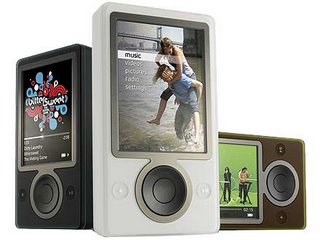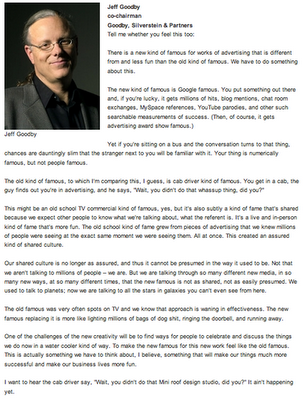 To take on the 79% market share ipod, Microsoft has released the Zune digital music and video player.
To take on the 79% market share ipod, Microsoft has released the Zune digital music and video player.
And to take on youtube, they've released Soapbox.
Once Microsoft gets involved in online ventures, does it take away some of the, forgive my use of the word, hipness associated with them? The joy of youtube, craigslist, myspace, facebook, and other internet funzones is that they're started by everyday joes who simply had a great idea and a passion for that idea. People like going to these sites because they're "innocent" and for the masses.
Now, that Fox Corp. has bought myspace and facebook and youtube are accepting ads, does it diminish the fun factor of these sites? Once a corporation gets involved, it usually takes away the fun-loving entreprenurial feel of the venture.
Perhaps it might be the same with agencies (who are usually part of corporations) creating myspace pages and blogs for their clients.
From adage.
Tuesday, September 26, 2006
Microsoft fights back
By David Wen 0 comments
Labels: culture
Tuesday, September 19, 2006
Jeff Goodby speaks

Over at Room 116, Bryan Chiao has posted a thought-provoking article that Jeff Goodby wrote about the attention that your work achieves or as Bob Scarpelli calls it talk value. Since I can't excerpt it because it's a .png, here it is.
By David Wen 0 comments
Labels: industry
Tuesday, September 12, 2006
Top Ten List for Jr. Creatives
 photo by Sanford Myers/The Tennesean
photo by Sanford Myers/The Tennesean
On Mack Simpson's Adverb Blog (UT ad grad and CD at Dieste Harmel) there is a wonderful and most excellent post with free advice for the budding jr. creative graduate or current student.
Everybody should take these to heart.
By David Wen 0 comments
Labels: advice
Thursday, September 07, 2006
My tagline
 Stuart Elliot wrote an article in the NY Times about how, in this day and age, advertising messages are becoming more personalized.
Stuart Elliot wrote an article in the NY Times about how, in this day and age, advertising messages are becoming more personalized.
Is this a passing trend or is it here to stay? Some taglines I recall off the top of my head are Budweiser- True, Hummer- Like no other, and Jeep- Only in a Jeep.
Excerpted below.
May 2, 2006
Advertising
Nowadays, It's All Yours, Mine or Ours
By STUART ELLIOTT
My, my, my.
Madison Avenue has become obsessed with using the word "my" — along with "your" and "our" — in advertising slogans, as well as in the names of brands, products and even a new television network.
The trend is inspired by a desire by marketers to demonstrate that they understand changing consumer needs by, literally, putting the customer first. They're doing so in everything from the new network, to be called My Network TV, to Web addresses like mycokerewards.com to campaign themes like "My life. My card," for American Express.
"Brands are becoming more personalized and customized because consumers want brands on their terms," said Allen Adamson, managing director at the New York office of Landor Associates, a corporate identity consulting company owned by the WPP Group.
"Having it your way applies increasingly to all brands," Mr. Adamson said, referring to the longtime campaign theme for Burger King, which has recently been revived. "It's only natural that advertisers try to flag that they are more about serving up your brand on your terms."
But the trend carries a big risk, Mr. Adamson warned.
"The demand for customization and personalization is a moving target," he said. "If you're unable to deliver, if what you offer is really no different from everybody else, the claims will do more damage than good."
...Mycoke.com, which started as cokemusic.com, was renamed a year ago after research showed that "what people loved to do most is take the site and make it their own, sharing music and film with their friends," said Katie Bayne, senior vice president for Coca-Cola brands in North America, who is based in Atlanta.
...To be sure, the current crop of possessives is not the first from marketers. The Burger King entry, "Have it your way," dates to 1974, and in the 1950's, commercials for Rheingold beer featured a chorus of drinkers who robustly sang a song that began, "My beer is Rheingold, the dry beer."
But none of the top 10 ad slogans of the 20th century, selected by the trade publication Advertising Age in 1999, use "my" or "our" or "your." Most are from the perspective of the marketer or brand like "We try harder," for Avis; "Good to the last drop," for Maxwell House coffee; and "When it rains it pours," for Morton salt.
A turning point may have come in 1996, when Yahoo introduced a personalization service called My Yahoo (my.yahoo.com). It has grown to about 55 million unique users each month, said Meagan Busath, a spokeswoman for Yahoo in Sunnyvale, Calif.
The name was chosen to "indicate to people it's a site they can create for themselves and can be personal to them," she added.
The "My life. My card" campaign from American Express, created by Ogilvy & Mather Worldwide, part of WPP, began in November 2004.
"American Express is all about relationships with consumers," said Joanna G. Lambert, a spokeswoman for American Express in New York. "The 'My life. My card' campaign showcases the connection with our customers."...
By David Wen 0 comments
Labels: industry
Tuesday, September 05, 2006
Clinton is on facebook
 Is having politicians on a social networking site necessarily a good thing? I'm wondering how facebook will affect their goal of promoting political activism. Besides, a true and active voter would look at the the candidates voting records and do more in-depth research than surf a facebook profile...right?
Is having politicians on a social networking site necessarily a good thing? I'm wondering how facebook will affect their goal of promoting political activism. Besides, a true and active voter would look at the the candidates voting records and do more in-depth research than surf a facebook profile...right?
Facebook the Vote!
by Ezra Callahan 1:28am Friday, Sep 1
Facebook wants you...to make your voice heard this November. In the past if you happened upon Hillary Clinton or Arnold Schwarzenegger on Facebook, you'd have good reason to question the authenticity of the profile. If you search for them today, you're going to see something different.
We've now got about 1,600 profiles for candidates running for House and Senate seats and state governorships this November. These profiles are controlled by the politicians, so they can show you a side of themselves that you'd never see in TV spots or even on live debates.
Add candidates and campaign issues you support by going to the Election tab on the Edit Profile page.
We wanted to do something to increase the political voice of the people on Facebook, a group that tends to be on the younger side of the electorate and which is often underrepresented in Washington and state capitals. By bringing politicians to Facebook, you can engage with candidates on your turf, in ways that are familiar and meaningful to you. Where better for politicians to meet you guys than on the "series of tubes" where you spend so much time?...
Ezra Callahan is the product manager for this project.
By David Wen 1 comments
Labels: online
The Desperate Loner: Why isn't Guerrilla advertising used more?

There's an interesting interview over at Ad-land about the use of guerilla advertising (streetvertising, assvertising, etc). I found this excerpt about staying on strategy to be most insightful.
db: You know, that bit about using or inventing new channels is interesting, but sometimes it seems as if that is the only thing you do when you "do guerrilla". Nicorette did these really nice enamel signs in the London Underground ten odd years ago, where they were placed right underneath the non smoking signs. Nicorette's sign read: "it's times like these you need Nicorette" (or words to that effect). There, the new channel is perfect for the target group but sometimes you see new media invented just for invention's its sake. Could you name a "right" channel and a "wrong" channel, and how does that happen?
Fredrik: Yes, often you see that people mess it up just by throwing out some fun happening at a town square without thinking. The key word is relevance. Then you'll meet the target group where it is so incredibly spot on. If for example, you are going to create advertising in the toilet it's an advantage if the company and the message has something to do with shit. And all that. SMS advertising is something that I personally don't believe in much.
Advertising on the back of parking tickets isn't always good either, although right now were actually doing something where an extremely relevant message would fit nicely on a ticket. Those "home made" notes that are stuck everywhere and are difficult to remove aren't that much fun. I was never a big fan of "wild posters" either. What I do like are things like our "price tag" for hyresgästsföreningen, as it was distributed via the members magazine and they themselves put the tags up on their doors to engage other people in their building. There's been an inflation in post-it notes and I don't want to use that again no matter how relevant it might be.
By David Wen 0 comments
Labels: industry



